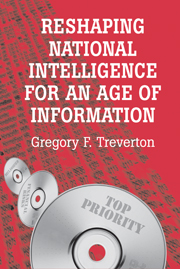Book contents
- Frontmatter
- Contents
- Foreword
- Preface
- Note on sources
- 1 The imperative of reshaping
- 2 The world of intelligence beyond 2010
- 3 The militarization of intelligence
- 4 Designated readers: the open source revolution
- 5 Spying, looking, and catching criminals
- 6 The intelligence of policy
- 7 A reshaped intelligence
- Index
6 - The intelligence of policy
Published online by Cambridge University Press: 23 May 2010
- Frontmatter
- Contents
- Foreword
- Preface
- Note on sources
- 1 The imperative of reshaping
- 2 The world of intelligence beyond 2010
- 3 The militarization of intelligence
- 4 Designated readers: the open source revolution
- 5 Spying, looking, and catching criminals
- 6 The intelligence of policy
- 7 A reshaped intelligence
- Index
Summary
In the autumn of 1990, my predecessors at the National Intelligence Council (NIC) predicted Yugoslavia's tragedy with a prescience that is awe inspiring. The national intelligence estimate, or NIE, concluded that Yugoslavia's breakup was inevitable. The breakup would be violent, and the conflict might expand to spill into adjacent regions. The analysis could not quite foresee the horror and special evil of what came to be called ethnic cleansing. Still, providing some shape to an uncertain future is impressive enough for intelligence, and this analysis actually predicted that future. This estimate was no weasel-worded least common denominator. The footnotes that registered dissenting opinions all sought to paint the outcome as gloomier than the basic text, not less so.
Yet so far as I can tell, the document had no effect. None. The reasons are provocative for understanding the connection between intelligence and policy. The senior levels of the Bush administration's foreign policy machine were preoccupied with other issues, so being told of one more disaster lurking in the wings was unwelcome information. It was news they did not want to hear. Hoping that Yugoslavia might somehow stay together was convenient. That convenience was reinforced, for many at the top of government, by experience. Lawrence Eagle-burger, the deputy secretary of state, had been a Yugoslav “hand” as a foreign service officer; Gen. Brent Scowcroft, the president's national security advisor, had served there as a military attaché.
- Type
- Chapter
- Information
- Reshaping National Intelligence for an Age of Information , pp. 177 - 215Publisher: Cambridge University PressPrint publication year: 2001

